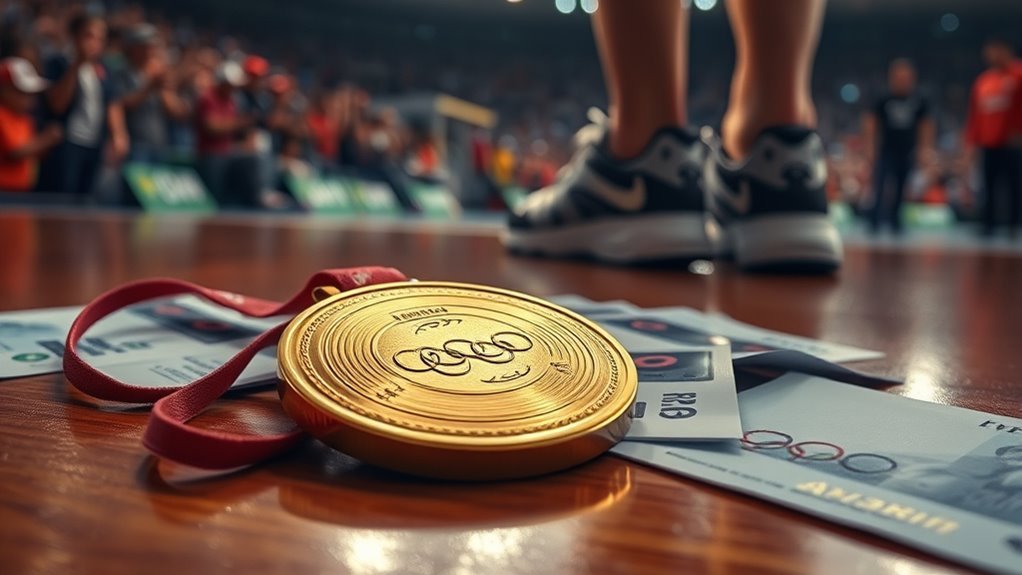Olympic athletes’ earnings can vary widely based on factors like sport and sponsorship opportunities. Some athletes make significant money from endorsements and prize money, while others struggle without much financial support. Individual sports tend to offer higher rewards, with lucrative deals for top performers. Team sports generally have lower earnings due to their dependence on team success. If you want to explore the different income sources and factors affecting these variations, there’s more to uncover.
Overview of Olympic Athlete Earnings
Have you ever wondered how much Olympic athletes actually earn? It might surprise you to learn that there’s a wide range of earnings, often reflecting financial disparities between sports and countries. While some athletes secure lucrative sponsorships, others struggle to make ends meet, highlighting the stark contrasts in the Olympic world. Many athletes make tremendous sacrifices, dedicating years of their lives to training, often at the cost of traditional careers. The commitment they show can lead to incredible achievements, but financial rewards don’t always match their hard work. With limited government support in some regions, the journey can feel intimidating. It’s crucial to acknowledge their struggle and the sacrifices they make in pursuit of glory, freedom, and personal fulfillment.
Sources of Income for Olympic Athletes
When you think about how Olympic athletes earn money, several key sources come to mind. Sponsorships and endorsements can greatly boost their income, while prize money from competitions adds to their financial rewards. Additionally, many athletes receive support through government grants, helping them focus on their training and competition.
Sponsorship and Endorsements
While competing at the Olympic level demands immense dedication and skill, many athletes also rely on sponsorships and endorsements to bolster their income. A smart sponsorship strategy can greatly enhance an athlete’s financial freedom. Companies are enthusiastic to partner with you if you can showcase your talent and charisma. Endorsement deals often bring in substantial revenue, allowing you to focus more on your training and less on financial stress. These partnerships can range from apparel brands to nutrition companies, each bringing unique opportunities. By creating a strong personal brand and actively engaging with your audience, you can attract lucrative deals that not only support your Olympic journey but also pave the way for a successful post-competition career.
Prize Money Awards
Although sponsorships play an essential role in an Olympic athlete’s income, prize money awards also contribute considerably to their earnings. The methods of prize distribution can vary greatly depending on the sport and country, impacting how much athletes actually take home. Historically, prize comparisons show that Olympic medalists can earn significant rewards, especially in high-profile sports.
- Top-tier athletes can receive bonuses for podium finishes.
- Different countries have varying rewards; some provide substantial financial incentives for gold, silver, and bronze medalists.
- Prize money can also come from international competitions leading up to the Olympics.
Understanding these aspects gives you a clearer view of an athlete’s financial landscape beyond just sponsorships.
Government and Grants
Many Olympic athletes rely on government support and grants to supplement their income, especially since training and competition expenses can be substantial. Government funding plays a vital role in helping athletes pursue their dreams without financial burdens weighing them down. For many, athlete grants provide much-needed relief, allowing them to focus on their training and performance rather than worrying about making ends meet. These funds can cover everything from coaching fees to travel expenses, giving you the freedom to train at your best. While not every athlete qualifies for government assistance, those who do often find it instrumental in their journey to competing on the world stage. Embracing this support can make all the difference in achieving your Olympic aspirations.
The Role of Sponsorships
Sponsorships play a vital role in an Olympic athlete’s earnings, often making up a significant portion of their income. You’ll find that different types of sponsorship deals can vary widely, from apparel endorsements to performance bonuses. Understanding how these deals impact an athlete’s financial landscape is essential for grasping the full picture of their earnings.
Types of Sponsorship Deals
Olympic athletes often rely on various types of sponsorship deals to supplement their income and support their training. These partnerships can offer much-needed financial stability, allowing you to focus on your performance without constant worry. Here are some common types of deals:
- Brand Collaborations: Partnering with companies to promote their products, often leading to unique campaigns that resonate with fans.
- Endorsement Strategies: Signing contracts to represent a brand, which can include appearances, social media promotions, and more.
- Performance Bonuses: Earning additional income based on achieving specific milestones or performances, creating an incentive for excellence.
Impact on Athlete Earnings
While the thrill of competition drives athletes, sponsorships play an essential role in shaping their financial landscape. These partnerships can create significant financial disparities among athletes, impacting their lifestyle and opportunities.
| Type of Sponsorship | Potential Earnings |
|---|---|
| Endorsements | $100,000 – $5 million |
| Product Collaborations | $50,000 – $2 million |
| Performance Bonuses | $10,000 – $1 million |
With the right sponsorships, you can elevate your career, access better training facilities, and enjoy a more fulfilling athlete lifestyle. However, not all athletes secure lucrative deals, which can create a sense of disparity in the competitive arena. Embracing a freedom-driven mindset can help you navigate these challenges and maximize your potential.
Prize Money and Performance Bonuses
How do athletes turn their hard work into financial gain? For many, prize money and performance bonuses are key elements of their income. This prize distribution varies by sport and country, but it’s a powerful motivator.
- Olympic medals often come with significant cash rewards from national sports organizations.
- Performance bonuses are frequently offered by sponsors, rewarding athletes for breaking records or achieving personal bests.
- Sponsorship deals can further enhance earnings based on visibility and marketability during competitions.
These athlete incentives not only recognize excellence but also provide the freedom to pursue their passions without financial strain. So, while the grind is intense, the potential for financial success makes it all worthwhile.
Government Support and Funding
As athletes endeavor for excellence, government support and funding play an essential role in their journey. Many countries offer government programs designed to help athletes pursue their dreams without the burden of financial stress. These funding opportunities can cover training costs, travel expenses, and equipment, allowing you to focus solely on your sport. It’s crucial to explore these programs, as they can greatly impact your development and success. While not every athlete may receive substantial support, those who do can gain a competitive edge. By leveraging these resources, you’re not just investing in yourself; you’re embracing the freedom to chase your Olympic aspirations without limitations. So, take the time to research what’s available to you!
Variations Across Different Sports and Countries
Though funding and support are essential for all athletes, the financial landscape can vary dramatically across different sports and countries. You’ll notice major country comparisons and sport disparities when looking at how much Olympic athletes earn.
- In countries like the U.S., athletes in high-profile sports often rake in significant endorsements, while others can struggle.
- Countries with less funding may rely more on grassroots support, impacting athletes’ financial stability.
- Individual sports, like tennis, often yield greater financial rewards than team sports, which can create stark contrasts in earnings.
Understanding these variations helps you appreciate the unique challenges athletes face globally. It’s a reminder that freedom in sports isn’t just about competition; it’s also about securing a sustainable livelihood.
Frequently Asked Questions
Do Olympic Athletes Have to Pay Taxes on Their Earnings?
Yes, Olympic athletes do have to pay taxes on their earnings, but it’s not just their prize money. Tax implications can vary based on income sources, including sponsorships and endorsements. While some might think they deserve a break due to their dedication, the reality is that taxes are part of the system. Embracing this responsibility can empower you to better manage your finances, ensuring your hard work pays off in the long run.
How Do Endorsement Deals Differ Among Various Sports?
Endorsement deals can vary greatly based on sport popularity and athlete visibility. If you’re in a high-profile sport like basketball or soccer, your endorsement strategies might include lucrative contracts with major brands. In contrast, athletes in less popular sports may struggle to secure similar deals. Your marketability often hinges on your performance and public persona, so leveraging social media and personal branding can help boost your endorsement potential, regardless of your sport.
Can Athletes Lose Sponsorships After Poor Performances?
Absolutely, athletes can lose sponsorships after poor performances. It’s like walking a tightrope; one misstep and sponsors might pull the safety net away. The sponsorship pressure is immense, with performance expectations soaring higher than the Olympic rings. If you stumble, brands might seek a more reliable face to represent them. While freedom is essential, the reality of endorsements often ties you to a relentless chase for success, leaving little room for error.
What Happens to Athletes’ Earnings After Retirement?
After retirement, athletes’ earnings can shift considerably. Many pursue post-retirement careers, leveraging their fame in coaching, media, or brand partnerships. It’s essential to focus on financial planning during this change, as income may fluctuate. You might explore new passions or invest in businesses to secure your financial future. Embracing this change can lead to newfound freedom, allowing you to define your path outside the competitive arena.
How Do Athletes Balance Training With Earning Income?
Athletes often juggle intense training schedules with the need for financial stability, and about 80% of them have side jobs or sponsorships to support their dreams. To achieve this balance, you’ll need strong financial planning skills, ensuring your income can sustain your training. Creating a flexible schedule allows you to focus on your sport while still earning. Embracing this duality can lead to the freedom you crave in pursuing your athletic ambitions.




